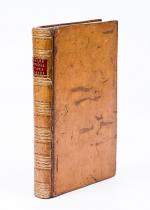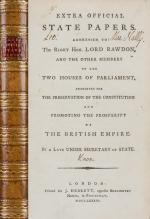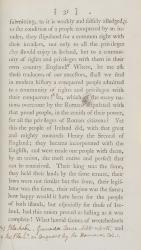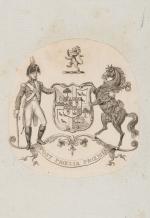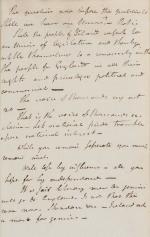[Knox, Extra Official State Papers. Addressed to The Right Hon. Lord Rawdon and
Extra Official State Papers. Addressed to The Right Hon. Lord Rawdon and the Other Members of the Two House of Parliament, Associated for the Preservation of the Constitution and Promoting the Prosperity of the British Empire. By a Late Under Secretary of State [William Knox].
London, J.Debrett, 1789. 8°. 49, [1], 14, [2], 174 [2] pages plus Errata-leaf. Original Hardcover. Contemporary Irish calf with gilt lettering and ornament on spine / edges in light green. Neatly rebacked. Gilt ornaments on spine with beautiful original spinelabel. In overall excellent condition. This thoughtful work on Irish politics and history was written by an Irish-born government official, and subsequently owned by two significant figures in Irish history, both of whom have left their mark on it. The first was the spy and co-founder of the United Irishmen, Leonard Macnally who has signed and annotated the text, followed by Warner William Westenra second Baron Rossmore who has left his notes and jottings on the Act of Union.
[SABIN 38181]
The title page bears the ownership signature of Leonard Macnally who signs himself ‘Leo: MacNally’ with the name of the anonymous author ’[William] Knox’ written in his hand below. Macnally, a barrister and playwright, is now remembered as a notorious spy for the British government, exploiting his status as a co-founder of the United Irishmen to betray friends and republican clients such as Wolfe Tone even as he purported to defend them in the court cases that followed the rebellion of 1798. In addition to his ownership signature MacNally has lightly annotated Knox’s Appendix which contains a ‘Paper delivered to Lord Frederick Campbell, when appointed Secretary to Ireland, 1767’ in which the author addresses the ‘tyranny’ of aristocratic government in Ireland, lamenting the ‘wretched… ancient condition of Ireland… in respect to property’ ownership. MacNally’s interest seems to lie in Knox’s reading of the history of Irish land tenure with five inked annotations setting out the legal justification for Knox’s historical analysis, frequently by reference to Blackstone’s Commentaries on the Laws of England.
The bookplate of the Barons Rossmore appears on the front pastedown, almost certainly Warner William Westenra (1765-1842) the second Baron Rossmore, who was briefly a member of the Irish Parliament before losing his seat in the Act of Union, returning to spearhead a campaign to reform the representative peerage in Ireland, finally serving as Lord Lieutenant of Monaghan (Bookplate Motto “Post Proelia Praemia” [After battles, rewards]. On the penultimate blank endpaper, Westenra wrestles with the implications of Union with the UK, apparently writing before the act: ‘The question now before the public is shall we have an Union?… Shall the people of Ireland consent to an Union of Legislature… The voice of thousands cry out no – that is the voice of thousands exclaim – let material pride trample upon national interest.’ Alluding to one of the perennial features of Irish history, Rossmore acknowledges: ‘Literary men of genius will go to England’, but resignedly continues, ‘Is that not the case now – Sheridan &c’ [Description: Christian White]
KNOX, WILLIAM (1732–1810), official and controversialist, was born in Ireland in 1732. He received the rudiments of his political education from Sir Richard Cox [q. v.] Lord Halifax appointed him ‘one of his majesty’s council and provost-marshal of Georgia,’ when Henry Ellis [q. v.] was made governor of the colony. Ellis and Knox arrived at Savannah on 16 Feb. 1757, and Knox did not return to England until 1761. Lord Grosvenor was then his friend and patron; they were at Paris together in 1763, and it was probably through Grosvenor’s influence that Knox obtained his introduction to George Grenville. He became agent in Great Britain for Georgia and East Florida, and in the interests of the colonies sent a memorial to Lord Bute, recommending the creation of a colonial aristocracy and the inclusion in parliament of representatives of the colonies; but his services as agent were dispensed with by resolution of the Georgia assembly on 15 Nov. 1765, for two pamphlets written in defence of the Stamp Act, which he considered to be the least objectionable mode of taxation. In the same year (1765) he gave evidence before a committee of the House of Commons on the state of the American colonies, and from the institution of the secretaryship of state for America in 1770 to its suppression by Lord Shelburne in 1782, he acted as the under-secretary. His views formed a basis for the conciliatory propositions of Lord North in 1776; he suggested the creation of a separate loyalist colony in Maine in 1780, which was approved by the king and ministers, but abandoned through legal difficulties, and to his zeal were ascribed many of the measures taken against the American colonies. On the suppression of his post he sought for compensation, but it was refused on the ground that his services were sufficiently rewarded in the two pensions of 600l. a year each bestowed by the state on him and his wife for the loss, as loyalists, of their property in America. In 1772 the ‘reversion of the place of secretary of New York’ (Calendar of Home Office Papers, 1770–2, p. 581) was granted to him, but it never brought him any emolument. Knox continued to be consulted even after his dismissal from office. He drafted in July 1783 an order in council excluding American shipping from the West Indies, and on his suggestion the province of New Brunswick was created in 1784, and lands were granted to the expelled loyalists of New York and New England. After the death of Sir James Wright in 1786 the loyalists of Georgia made him their attorney to press their claims to compensation, but his active life then ceased. He died at Ealing, near London, on 25 Aug. 1810.
Knox published numerous pamphlets. The chief were: 1. ‘A Letter to a Member of Parliament, wherein the Power of the British Legislature and the case of the Colonists are briefly and impartially considered’ [anon.], 1764. 2. ‘The Claim of the Colonies to an Exemption from Internal Taxes imposed by authority of Parliament examined’ [anon.], 1765. These were the two pamphlets that lost him his post of agent. 3. ‘Three Tracts respecting the Conversion and Instruction of the Free Indians and Negroe Slaves in the Colonies’ [anon.], n. p. or d. [1768]; new edit., with his name, 1789. They were written at the desire of Archbishop Secker. 4. ‘The Present State of the Nation, particularly with respect to its Trade, Finances, &c.’ [anon.], 1768; 4th edit. 1769. It was written by Knox, with the assistance of George Grenville, and many portions which were translated into French and Spanish were openly attributed to Grenville. Many of its prognostications were very gloomy, and it contained numerous reflections on Rockingham’s friends. These provoked Burke into replying with ‘Observations on the Present State of the Nation,’ in which he ridiculed his opponent as writing ‘a funeral sermon’ (Works, 1852 ed., iii. 7–108). Burke’s tract went through several editions, and evoked from Knox ‘An Appendix to the Present State of the Nation, containing a Reply to the Observations on that Pamphlet’ [anon.], 1769. Walpole says that from the ‘same mint’ of Grenville and his friends had previously come ‘Considerations on Trade and Finance’ (Memoirs of George III, 1845 ed., iii. 333–5). 5. ‘Controversy between Great Britain and her Colonies reviewed’ [anon.], 1769, republished 1793. In this Knox was also assisted by Grenville. 6. ‘A Defence of the Quebec Act,’ 1774, two editions. 7. ‘Considerations on the State of Ireland’ [anon.], 1778, reprinted in ‘Extra-Official State Papers,’ App. i. 22–61. 8. ‘Helps to a Right Understanding the Merits of the Commercial Treaty with France,’ 1788. Knox’s desire to augment Irish trade is shown in this tract, and in his letters described in the Hist. MSS. Comm. 8th Rep. App. i. p. 200, and App. iii. p. 39. 9. ‘Extra-Official State Papers addressed to Lord Rawdon and others. By a late Under-Secretary of State, 1789, 2 vols. 8vo. 10. ‘Considerations of the Present State of the Nation, addressed to Lord Rawdon and others. By a late Under-Secretary of State,’ 1789. 11. ‘Observations upon the Liturgy, with a Proposal for its Reform. By a Layman of the Church of England, late an Under-Secretary of State,’ 1789. 12. ‘Letter from W. K., Esq., to W. Wilberforce,’ 1790, respecting the latter’s exertions for the slaves. 13. ‘Letter to the People of Ireland upon the intended Application of the Roman Catholics to Parliament for the Exercise of the Elective Franchise,’ 1792. 14. ‘Friendly Address to the Clubs in St. Ann, Westminster, associated to obtain a Reform in Parliament,’ 1793. 15. ‘Considerations on Theocracy, by a Layman of the Church of England,’ 1796, in favour of ‘universal goodwill towards our fellow-creatures.’ Watt attributes to Knox ‘The Revealed Will of God the sufficient Rule of Men,’ 1803, 2 vols. Several letters to and from George Grenville are in the ‘Grenville Papers,’ vols. iii. and iv., and Knox’s opinions are often mentioned in Thomas Hutchinson’s ‘Diary.’ (Source: Dictionary of National Biography / Wikisource)
- Keywords: 18th Century · 18th Century – Rare · American History – Rare · Catalogue Irish History Two – Origins of Irish Identity · Catalogue One – History of Law · Irish History · Irish History – Rare · Irish History of the 18th century · Spy · United Irishmen · William Knox
- Language: English
- Inventory Number: 27955AB
EUR 380,--
© 2026 Inanna Rare Books Ltd. | Powered by HESCOM-Software







